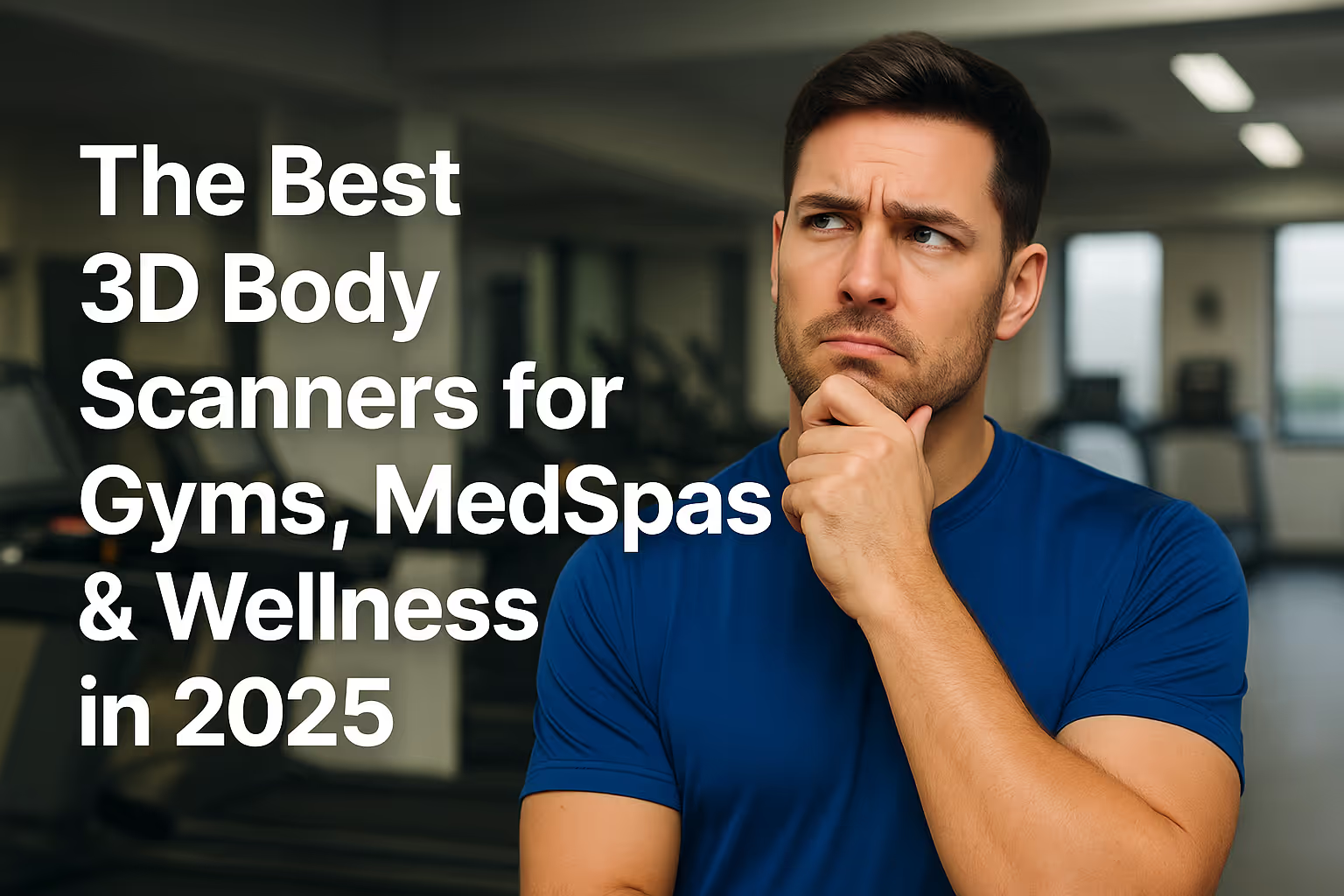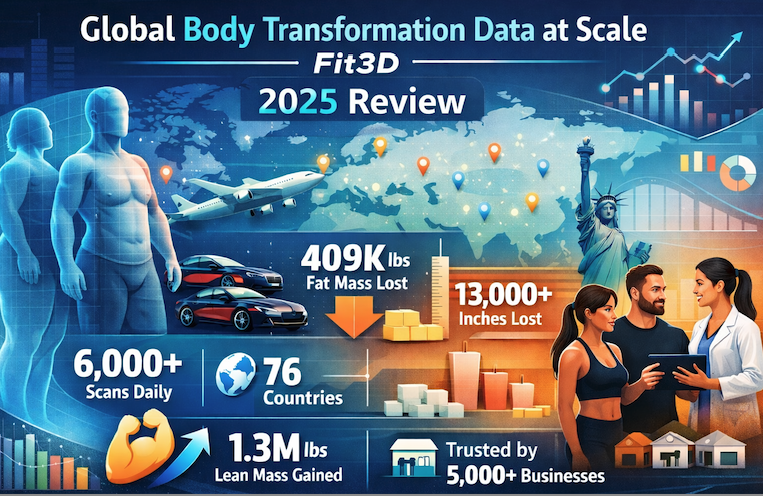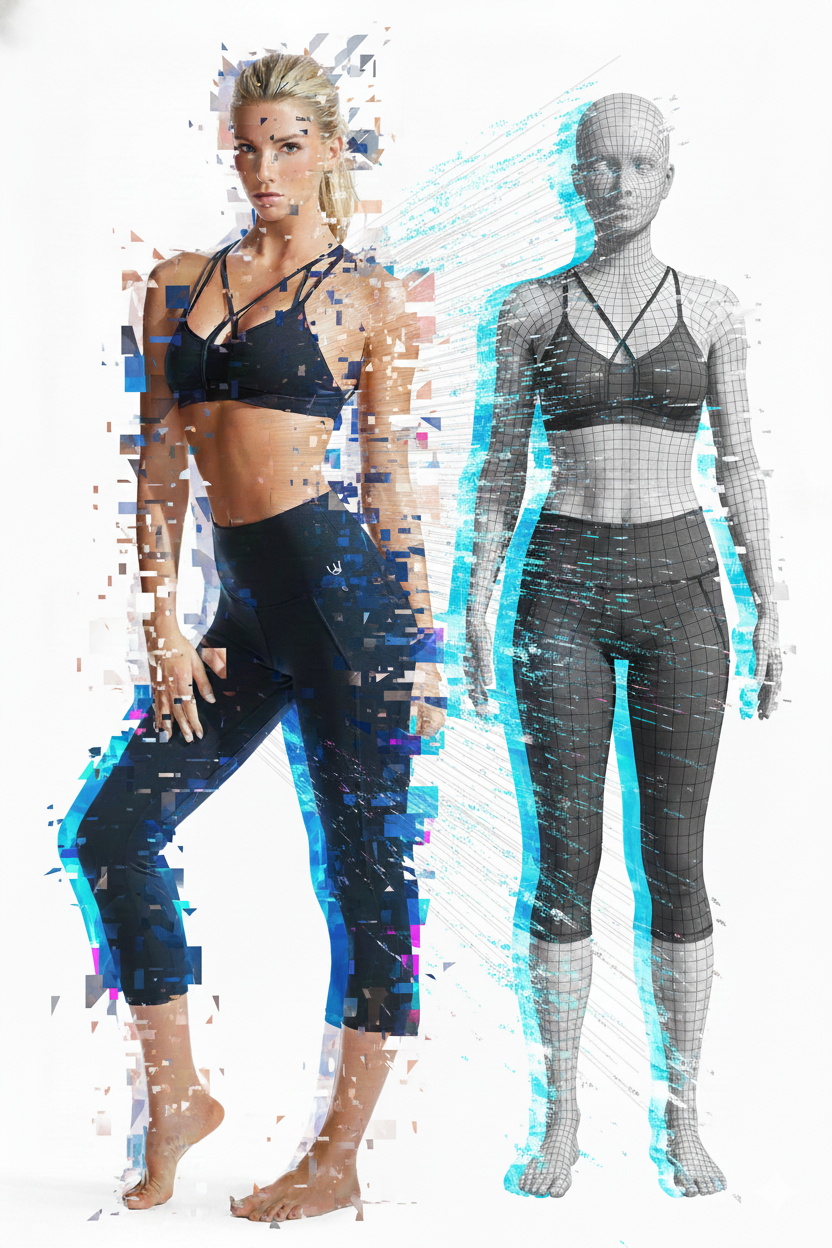
The Best 3D Body Scanners for Gyms, MedSpas & Wellness in 2025
In 2025, gyms, medspas, and wellness centers are turning to 3D body scanners not just for progress tracking—but to drive revenue, reduce churn, and elevate the client experience. Whether you're a gym owner or health professional, choosing the right scanner can make a direct impact on your business outcomes.
This guide breaks down the top 3D body scanners by use case, technology, and return on investment—so you can choose the right fit for your operation.
What Is a 3D Body Scanner?
A 3D body scanner is a device that captures full-body measurements and body shape in a digital, three-dimensional format. Unlike traditional weight scales, these scanners provide visual insights into body fat percentage, circumferences, posture, and shape changes over time.
Originally developed for the fashion industry, 3D scanning now plays a key role in fitness, healthcare, plastic surgery, research, gaming, and even film production.
How 3D Body Scanners Work
Most scanners use one or more of the following technologies:
- Photogrammetry – Dozens of photos from multiple angles are stitched together to form a 3D model.
- Structured Light – Infrared light patterns are projected onto the body and analyzed for depth.
- Time-of-Flight / Depth Sensors – Infrared light is used to measure distances and create a depth map.
- Hybrid Systems – Combine multiple scanning methods for higher fidelity.
The result is a visual model that captures real measurements and changes over time. In fitness settings, this allows clients to see progress rather than relying on potentially misleading weight alone.
Why Scanners Are Replacing Scales
Weight is a poor proxy for body change. Clients building muscle and losing fat may see little movement on a scale—even if their body is dramatically transforming.
That’s why fitness operators are investing in 3D scanning: it provides visual accountability, objective progress markers, and a better sales and retention tool.
The Top 3D Body Scanners for 2025
🥇 Fit3D SNAP
Best for: SMB gyms, personal trainers, and medspas
Price: ~$300 device + monthly subscription
Technology: Mobile app + Android tablet (BYOD)
SNAP is disrupting the 3D scanning market with a low-cost, no-hardware-required model. Built to run on Android tablets, SNAP uses photogrammetry and depth sensors to capture full-body avatars and measurements in under two minutes.
- Used by thousands of operators to generate $2K–$5K in new monthly revenue
- Built-in playbooks to convert scans into sales
- Developed using validated DXA datasets
- Includes before/after visuals, body fat tracking, and postural reports
Verdict: Best balance of cost, usability, and ROI in the market today.
🥈 Fit3D ProScanner
Best for: Medium Studios, Multi-Location Fitness Franchises, Weight loss clinics, and research teams requiring high fidelity
Price: ~$10,000 + monthly subscription
Technology: Multi-camera system + rotating platform
The ProScanner is a commercial-grade platform used globally by fitness franchises, medical institutions, and wellness groups. With ASTM-aligned protocols and ultra-consistent measurements, it’s ideal for long-term body tracking and professional-grade results.
- Captures over 450 data points in under 35 seconds
- High consistency across multi-location rollouts
- Used in clinical trials, wellness programs, franchise deployments, and university research programs.
- Also built on DXA-derived body composition algorithms
- Includes a bilateral weight scale
- Ideal for showing high fidelity changes in muscle mass or localized fat reductions
Verdict: The go-to choice for accuracy, research, and enterprise-level tracking.
🧬 DXA (e.g., GE Lunar, Hologic)
Best for: Hospitals, universities, and advanced body composition labs
Price: $50,000+
Technology: Dual-energy X-ray absorptiometry
DXA remains the gold standard for internal body composition analysis. It measures bone density, lean mass, and fat tissue distribution—but is expensive, invasive (requires radiation), and not visual.
- Used in medical diagnostics and algorithm development
- Requires trained operators and dedicated space
- Underpins many body fat models used by Fit3D and others
Verdict: Ideal for medical-grade applications and research—not general wellness centers.
🧪 Canfield VECTRA 3D
Best for: Plastic surgeons and aesthetic medicine
Price: $15,000–$80,000
Technology: Multi-angle camera array with morphing software
VECTRA is used to simulate surgical outcomes such as breast augmentation, facial reconstruction, and body contouring. It helps clients visualize procedures before undergoing surgery and is a valuable consultation tool in cosmetic practices.
- Pre/post-op simulation software
- HIPAA-compliant imaging
- Frequently used in high-end surgical clinics
Verdict: Purpose-built for cosmetic planning—not body composition tracking.
🧵 Size Stream / TC2 Labs
Best for: Apparel brands, fit modeling, and clothing design
Price: $20,000–$60,000
Technology: Multi-camera body scan array
These scanners are used in the fashion and garment industry to capture posture, dimensions, and movement for custom-fit clothing. They are ideal for digitizing fit models and creating virtual try-on experiences.
- Precise limb and joint measurements
- Used by major fashion brands and manufacturers
- Not focused on fitness or fat loss insights
Verdict: Great for apparel—not for gyms or health use cases.
👤 Twindom / 3DMe
Best for: Events, cosplay, and consumer 3D avatars
Price: ~$20,000+
Technology: Full-body photogrammetry dome
These scanners are designed for personalization experiences—capturing the user in costume or everyday wear for 3D figurines, avatars, or AR applications.
- Popular at expos, malls, and conventions
- 3D print-ready files or digital avatar exports
- No measurement or body tracking utility
Verdict: Designed for entertainment and collectibles—not health or transformation.
🎮 3dMD / Artec Leo / Metashape Arrays
Best for: Film studios, VFX production, and AAA game developers
Price: $60,000+
Technology: Multi-angle high-res capture + motion integration
These Hollywood-grade scanners capture facial detail down to the pores. They’re used to create digital doubles for CGI in films, video games, and animation pipelines.
- Ultra-fine resolution
- Often integrated with motion capture systems
- Requires expert operators and large file handling
Verdict: Amazing for visual effects—not business-driven fitness operations.
🪜 Posture-Focused Scanner: Diers Formetric 4D
Best for: Chiropractors, physical therapists, and spine specialists
Price: $25,000–$40,000
Technology: Surface topography + structured light
The Diers Formetric 4D is a non-invasive scanner designed specifically for spinal posture analysis. It captures 3D images of the back and calculates spinal alignment, pelvic tilt, scoliosis indicators, and more—without radiation.
- No markers or skin contact required
- Real-time posture and symmetry visualization
- Common in chiropractic and orthopedic clinics
Verdict: Ideal for providers focused on spine health and postural diagnostics.
🏃 Functional Movement Scanner: Kinetisense
Best for: Functional fitness coaches, PT clinics, and performance centers
Price: ~$7,000–$15,000
Technology: Markerless motion capture via 3D camera
Kinetisense is a movement assessment tool that uses a depth-sensing camera to capture real-time joint motion, balance, and movement quality. Unlike static 3D body scanners, it assesses how the body moves, making it ideal for FMS (Functional Movement Screening), injury risk analysis, and athletic evaluation.
- Tracks range of motion, movement symmetry, and compensations
- Real-time feedback for corrective exercise programming
- Supports sports performance, rehab, and clinical settings
Verdict: A go-to tool for practitioners who focus on how the body moves, not just how it looks.
Final Thoughts: What Really Matters in a 3D Scanner?
Most gym and wellness business owners don’t need lasers, rotating robots, or cinematic rendering. They need tools that:
- Generate leads with free scans
- Sell more packages with visual results
- Keep clients engaged with measurable progress
- Build transformation portfolios to drive social proof
That’s why Fit3D SNAP is becoming the go-to choice for modern gyms—it delivers clinical-grade insight in a budget-friendly, scalable format.
Ready to see how Fit3D can transform your business?
👉 Visit fit3d.com or request a demo today.







